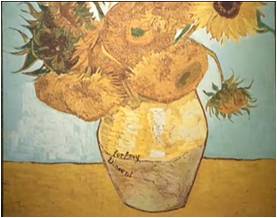THE TAKE AWAY
Science Fiction Part 2b
Calvinism and Vincent
By Kersley Fitzgerald


Sci Fi the Series
The Eternal God
Free Will and a Blue Box
Calvinism and Vincent
Faith of Dragons
Sins, Souls, and Sentience
Daughters and Gifts

I got to thinking about that last post about the show Doctor Who and God's sovereignty. I left off with a brief mention of the van Gogh episode, but it won't let me alone. For some time I've been trying to figure out how to get my head around Calvinism and evangelism and how the two seem so incompatible, and, after watching the ending of "The Doctor and Vincent" the other day, this episode seems to really fit the bill.
First off, background on the theology. Said simply, there are two schools of protestant thought when it comes to salvation. Arminianists believe that people can choose Christ; that they can join in the work of salvation. Calvinists believe in predestination; that God chose whom He would save at the beginning of time and we can do nothing to earn or work for salvation.
Although the Calvinistic viewpoint is the most biblical, it opens a huge can of worms. Because, if God already chose the people He's going to save, then why do we need to evangelize? It's a done deal no matter what we do.
One tangent before I return to our regular broadcasting. I recently spoke with a friend who is wise and searching, and wise because he is searching. We were talking about Calvinism and salvation and I had a "Yes! That!" moment. He said it is true that salvation is a done deal. But nowhere in the Bible does it indicate that the timing of salvation or the quality of the spiritual life is predetermined. While we cannot chose if we will be saved, we may have some influence over when. Deathbed conversions are romantic and all that, but not very fulfilling. Personally, I was saved at four-or-maybe-seven, and I can't imagine living eighty years without the comfort and guidance of God. So. That is one reason we should evangelize anyway and seekers should actively look for Christ.
Back to the time lord. But, beware, there are major spoilers.
So, the Doctor and his companion du jour, a saucy redhead named Amy Pond, decide to go back in time to meet Vincent van Gogh. They find him in France, broke, trying to trade a self-portrait for a bottle of wine. Unsuccessfully, because everyone thinks his art is rubbish. After a couple of scenes wherein the Doctor and Amy try to help him through his depression, he helps them contain a violent, abandoned, invisible, blind alien-chicken-lizard-monster (by accidentally killing it). In hopes of giving him hope and preventing the suicide that is to occur in a few months, Amy and the Doctor take Vincent forward to Amy's time, to the Marsee d'Orsay, where Vincent sees his works being revered by many and enthusiastically extolled by the docent. (This, combined with the background music, will necessitate a half of a box of tissues.) Bolstered by his new-found confidence, the Doctor and Amy return him to his time, then scurry back to the museum where Amy hopes to find he did not kill himself and, in fact, painted many more paintings.
But he did. And he didn't. And Amy breaks down because she grew very fond of him and all their efforts did nothing. (And the second half of the tissue box is called for.) They took him forward in time to show his effect on the world, and he still killed himself. The Doctor says to her, "The way I see it, every life is a pile of good things and bad things...The good things don't always soften the bad things, but vice-versa, the bad things don't necessarily spoil the good things and make them unimportant."

After the Doctor's speech, Amy catches something. The music swells as she approaches a painting of an unadorned vase of sunflowers. Except it's no longer unadorned — it's now dedicated "for Amy, Vincent." (And three more boxes of tissues are retrieved from the pantry.) She brought light, and she did make a difference. That was her job, and it's ours.
Tags: Calvinism-Tulip | Reviews-Critiques | Witnessing-Evangelism
comments powered by Disqus
Published 6-21-11

